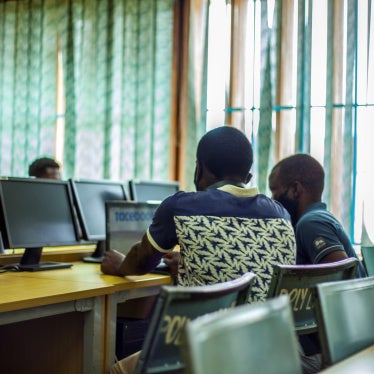(Nairobi) – Mali’s new action plan to combat child labor creates a huge opportunity to improve the lives of over two million Malian children working in harmful conditions, Human Rights Watch said today. The Malian government adopted the National Action Plan for the Elimination of Child Labor in Mali on the eve of the World Day Against Child Labor, June 12, 2011.
“Many thousands of small children forced to work under terrible, dangerous conditions stand to benefit from Mali’s ambitious plan,” said Juliane Kippenberg, senior children’s rights researcher at Human Rights Watch. “The challenge is now for the government to make sure it is carried out.”
According to the government, about half of Mali’s children perform hazardous labor – work that is likely to harm their health, safety, or morals. According to the International Labor Organization (ILO), many children start working as young as age 5. Major sectors using child labor are agriculture, domestic labor, artisanal (small-scale) gold mining, commerce, and fishing. Working severely impedes the children’s access to education. Some children are trafficked into exploitative work situations, from within Mali and the sub-region.
The action plan aims to eliminate the worst forms of child labor by 2015, and all child labor by 2020. During the first phase, it proposes to identify children working in the most hazardous jobs or who have been trafficked and withdraw them from these exploitative conditions. It also aims to provide these children with access to education, vocational training, and support, and offer income-generating activities for concerned families.
In addition, the action plan also envisages a law on child trafficking, prosecutions of child traffickers, and an increase of the minimum age of employment from 14 to 15 to comply with Mali’s international commitments. The government anticipates spending close to US$100 million over ten years to carry out the plan.
Human Rights Watch expressed concern that the plan does not adequately address the disastrous health implications of child labor, such as the use of mercury in artisanal gold mines. During recent investigations, Human Rights Watch found that many children amalgamate mercury with gold by hand, with no protection. Mercury is a highly toxic substance that targets the central nervous system and is particularly harmful to children. An international treaty to reduce the use of mercury globally is scheduled for adoption in 2013.
“Allowing children to use toxic substances such as mercury is a scandal,” Kippenberg said. “Stopping this practice immediately should be a priority as the government tries to abolish the worst forms of child labor.”
Human Rights Watch is also concerned that the action plan does not oblige companies to avoid benefitting from child labor directly or through their supply chains. Human Rights Watch called on businesses, the government, and donors to ensure that companies do not benefit from child labor.
“International donors should consider the fight against child labor a priority,” Kippenberg said. “Some nice words to welcome the plan won’t suffice. Donors should help the Malian government to make the plan a reality.”








